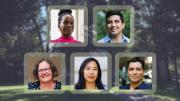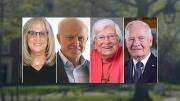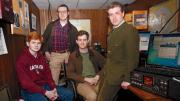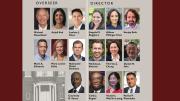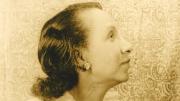Historian and writer Imani Perry is among five Harvardians named among the 2023 MacArthur fellows, announced today. The fellowship recognizes individuals across disciplines who have “shown extraordinary originality and dedication in their creative pursuits and a marked capacity for self-direction.” Each of the approximately two-dozen fellows is awarded $800,000, paid out over five years. The funds are a no-strings-attached investment in the promise of the fellows’ work.
Perry, the Morss professor of studies of women, gender, and sexuality and of African and African American studies, focuses her scholarship on the history of black American thinkers and artists—often black women—who have resisted oppression and racial injustice. Her 2022 book, South to America: A Journey Below the Mason-Dixon to Understand the Soul of a Nation, won the National Book Award for Nonfiction. Part travelogue, part memoir, and part historical research, it “thinks through the central role the South plays in American culture,” according to the MacArthur committee announcement. “For Perry, ‘the South’ is both a geography and a psychology, a duality that resonates with her own biregional upbringing.” Her work, the committee added, “illuminates rich, dynamic, and often overlooked facets of historical and contemporary culture.”
Perry is also the co-founder, with professor of education Jarvis Givens, of the Black Teacher Archive, which was unveiled to the public yesterday. Housed at Harvard Library, the collection brings together materials from across the United States related to African American educators, many of them working in segregated Southern schools during the twentieth century. Perry earned her Ph.D. in American Studies and J.D. from Harvard; she earned her bachelor’s degree from Princeton, where until earlier this year she was a professor of African American studies.
The other Harvard affiliates named as MacArthur fellows include:
Cellular and molecular biologist Jason Buenrostro, an associate professor of stem cell and regenerative biology and a member of the Broad Institute of MIT and Harvard. His research focuses on the mechanisms that regulate gene expression, and he has developed new technologies that allow scientists to see in greater detail how and when genes are “turned on.” Among those technologies is a DNA sequencing method called slide-DNA-seq, which identifies the spatial location of genetic mutations; in cancer research, it helps scientists understand the disease’s evolutionary pathways and identify potential treatments.
Environmental ecologist Lucy Hutyra, Ph.D. ’07, a professor at Boston University. She studies urbanization’s effect on environmental carbon cycle dynamics, drawing on a range of tools—field observations, remote sensing, spatial analysis, and mathematical modeling—to measure where, when, and how much carbon moves between the atmosphere and the biosphere. This is critical research for determining the effectiveness of carbon emission reduction and climate change mitigation strategies. Hutyra’s findings show that conserving urban forest fragments in growing cities can help mitigate climate change impacts in multiple ways. Helping to translate science into policy, she has sparked collaborations across disciplines, bringing together government and academic researchers. She is also an associate of the Arnold Arboretum and Harvard’s Department of Earth and Planetary Sciences.
Environmental engineer Linsey Marr ’96, a professor at Virginia Tech. Her research focuses on indoor and outdoor air quality and airborne pathogens, clarifying how diseases such as influenza and COVID-19 are transmitted and identifying public health interventions. In experiments using H1N1 flu virus aerosols, Marr and her team revealed the mechanism for how relative humidity affects virus stability, and when the pandemic hit, she was one of the first to argue that COVID-19 spread through aerosol transmission, infecting people both at close range and at long distances in indoor air. Her evidence eventually prompted a paradigm shift in the understanding of the virus.
Fiction writer Manuel Muñoz ’94, an English professor at the University of Arizona. Detailing the lives of people from the Mexican American communities of California’s Central Valley, he writes short stories that draw on his own upbringing in a Chicano family of farmworkers. The MacArthur committee described how his “nuanced depictions of this world are populated by mothers and sons, U.S.-born citizens and immigrants from Mexico, young gay men, and teenage parents.” His 2002 story collection, The Consequences, meditates on racial, gender, and class tensions and, the committee said, “the unrelenting hardships of agricultural labor, and everyday experiences of loneliness and longing…. Through closely observed, small moments, Muñoz captures the specificity of a region readers seldom see and reveals forms of resilience that come from refusing to surrender to misfortune.”
